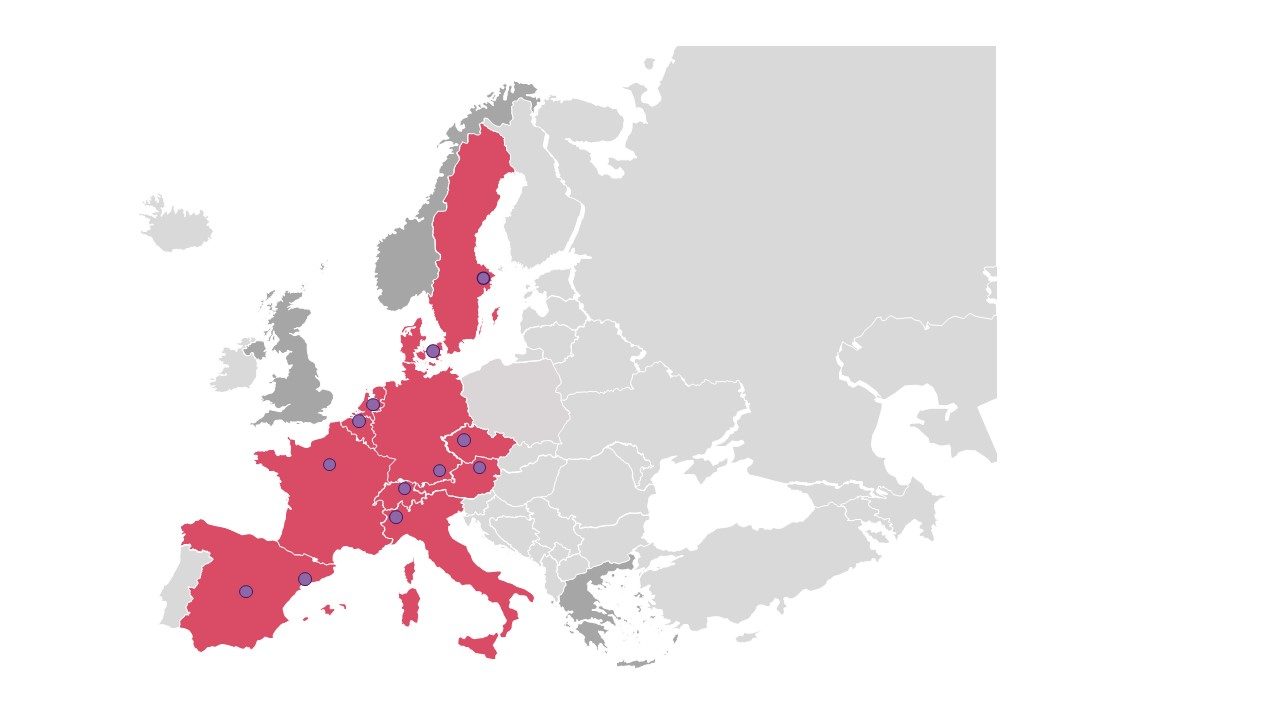Closed: EPIC-XS submissions.
There will be no upcoming calls for submissions as all sites have reached their pleged access days.
Thank you for your support of EPIC-XS.

There will be no upcoming calls for submissions as all sites have reached their pleged access days.
Thank you for your support of EPIC-XS.
There will be no upcoming joint calls, as all EPIC-XS access sites have reached their pleged access days. For submission of genomics projects please visit the EASI-Genomics website
Make sure your institute or research facility is based in one of the eligible countries. The user may not reside in the country where he/she has requested access to specific proteomic technology. Exceptions will be made with respect to generic scientific applications, where national access is allowed.
Projects will be related to proteomic research within the life science arena. All applications will be selected on their scientific merit, technical feasibility, International impact of the research and the standard of scientific expertise from the applicant.
While applicants can choose a preferred access site, (UCPH, UU, VIB-UGent, IP, FGCZ, CNIO, CRG, KTH, IMIC, CEITEC, TUM, IEO) the selection criteria will be based on the type of (unique) services provided by a facility and their proven expertise with such services. Reviewers may also give feedback as to which platforms are more suitable. If an applicant is unsure of which infrastructure best suits the project, a host infrastructure will be selected for the applicant based on project requirements.
In cases where the user has listed a preferred access site, it is the editor’s discretion to redirect a project to an alternative access site. This can occur in cases where the editor feels that the technology required for the project is better suited to the proteomics technology at another access site, for logistic purposes or at the request of the reviewer. This decision will always be discussed with the user and a check list will be discussed.
The principal investigator will be informed of the outcome of their proposal. In such cases where the proposal is rejected, an improved version of the proposal can be re-submitted in the next call. Evaluation reports will be provided for all projects.

.
Research project title: provide a title for your project.
Scientific background and significance: a concise introduction to the research topic (400 words maximum), with the background and rationale to the project as well as the expected impact of the research.
Description of experiments proposed: proposals should contain sufficient preliminary data to show that the experimental work is feasible (300 words maximum). Clearly indicate the proteomics technology intended for the project, the type and number of samples to be analyzed and include control experiments. There should be no safety or ethical issues preventing access.
Details of samples to be analyzed: Please indicate at least the name and taxonomy ID of organism from which the sample(s) originate(s) providing a short description of the steps involved in sample preparation. The final buffer/solution in which the sample will be provided for analysis and the (estimated) protein amount/concentration.
Expected Outcome: The applicant should include the projects contribution towards life science research, and how the proposed experiments will benefit the research question to be answered (300 words maximun).
This is your opportunity to exclude reviewers (see list at bottom of this webpage) that may have conflict of interest. Please note that the reviewers to be excluded will always be excluded, while the persons that are suggested by the applicant to review the proposal may be replaced by ones that may be more appropriate.
Please review you proposal carefully before submitting. Once you submit you can access your dashboard to check and follow the status. If you have any questions contact us by e-mail: m.c.oflaherty@uu.nl
Once the deadline for submission has passed, the submitted proposals will be assigned to the particular access site requested in the proposal. The moderator at that access site will assign three reviewers. Applicants might find it useful to read the EPIC-XS proposal moderator and reviewer guidelines below. Once a proposal is accepted, the applicant will be put in contact with the principal investigator at the access site where the experimental studies will be performed. Please note that a pilot project will first be performed to ensure that the study is viable.
Following the review process where an applicants proposal has been accepted for access, an official letter of acceptance can be requested from the coordinators office. Mail: info@epic-xs.eu
Editors should assess proposals according to the following initial criteria:
Editors must ensure that reports from at least three reviewers are received for each proposal. Reviewers should be appointed as quickly as possible once the deadline for proposal submission has been reached and proposals will be sent in batches (5 proposals at a time). The aim is to ensure that the review process runs efficently and that reviewers can provide a decision to the proposer within two weeks following the deadline for submission, unless there are circumstances involved which require further deliberation/ other information may be required for the evaluation process.
When sufficient reviews have been received, the editor decides on one of five outcomes:
The Editor may refer back to the reviewers at any time for help and comment on the proposal outcome to the applicant. The applicant will receive the reviewers decision as well as the decision of the editor.

EPIC-XS will provide around 2400 days of access to state-of-the-art proteomics facilities, which will be evaluated by an independent review panel to ensure excellence, and match users with the best facility for their challenging research questions.
When reviewing the proposal, please keep the following in mind:
It is the responsibility of all users who have been approved access to EPIC-XS that all scientifically peer-reviewed publications that stem and acknowledge EPIC-XS project activities must be provided as open access. Guidelines to to Scientific Publications and Open Access to Research Data in Horizon 2020 are available here: Guidelines on open access